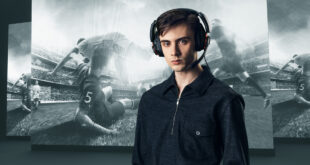When dealing with audio in games, one area that’s often overlooked is the technical side of creation and recording.
Editing and post-processing large scale voice over and localisation projects, as well as creating and implementing sound effects and music files, has made us realise how important setting out defined audio thresholds, over and above file type, sample rate and bit-depth specifications, has become.
With simultaneous recordings often taking place across our seven production facilities, as well as in other studios when necessary, we’ve found it essential to introduce specific guidelines for all of our audio creation producers to adhere to. The benefits of this are many – efficiency, quality, reduced post-production times and a smoother audio pipeline – to name a few. When setting out these guidelines, it’s important to think about the whole technical process from pre-production to final delivery.
WIRED FOR SOUND
At PitStop, we provide all of our studios with standard recording technical specification sheets, and these cover areas which include minimum and maximum audio capture levels, guidelines on mic placement, recording technique and compression, as well as a checklist covering foldback monitoring, talkback and mic and pre-amp checks.
Further measures can be put in place depending on where and when the recording is happening. If the session is not happening at one of our own studios, a full and thorough check of the facility is undertaken which includes speaking to the studio engineer, making sure they have suitable equipment, visiting the studio or seeing pictures of the space and asking to hear test recordings from the studio in order to suggest any improvements to the captured sound in advance of the session. You’ll find that most studios are more than willing to accommodate, as most engineers take great pride in the sound that can be achieved, and never like to be seen to be unable to provide anything but the highest quality.
During the recording itself, the aim of a standard practice is to allow the creativity and interpretation of the voice director and actor to be aided and fully realised. This means the engineer, having undertaken the preparation work, then has to be diligent in aiding the voice director in achieving the sound needed for the material. This includes being able to suggest recording techniques to further enhance specific material – whispers for example – all the while adhering to a quality and standard recording practice.
By controlling the parameters we can control, and removing the variances from non-creative elements, we’ve found that our voice directors and actors feel much more comfortable knowing they’re in a fully controlled environment where their performance and ideas will be enhanced.
CLEAR ADVANTAGES
Post-production is the area where the benefits of standardised audio practice become most obvious. Handling projects containing many tens of thousands of files which all need to be edited and post-processed to sound consistent gives the largest opportunity for a standard practice to be implemented.
We have a very specific way of post-processing and editing files which is fully documented and can be taught across a two-day training period. All of our editors go through this training process. By limiting as many technical variables during the recordings as we can, our editors know exactly what to expect. And by having a standard post-production technique, know exactly how to treat the files to ensure a quick and accurate turnaround of high quality audio which is ready to be implemented into the game.
It can be seen that by fully embracing standardised practices over all of the technical aspects of audio creation, the quality and efficiency of recorded and created audio can be increased, whilst the creative side can be aided due to increased confidence levels.
We believe that handling the audio production process in this way gives the best results. Drawing from this, we are now looking at ways of creating a similar pipeline to ensure pristine audio capture during full body and facial motion capture sessions where production costs are even higher and the need for a standardised practice is even greater.
www.pitstopproductions.co.uk

 MCV/DEVELOP News, events, research and jobs from the games industry
MCV/DEVELOP News, events, research and jobs from the games industry


